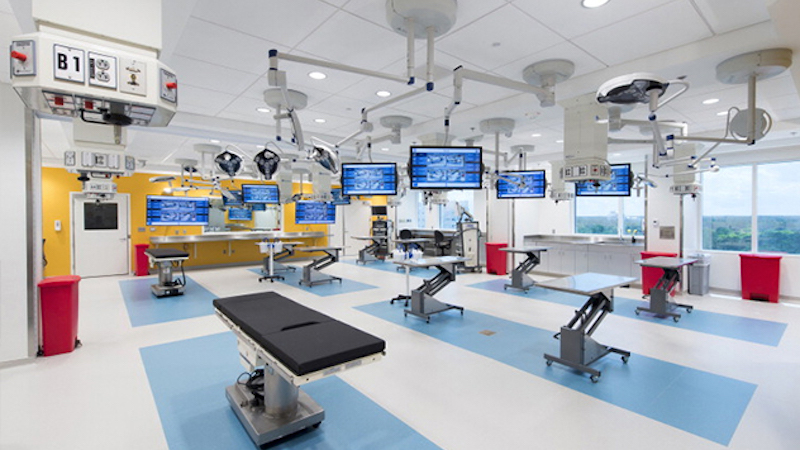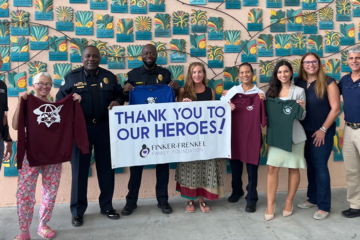Partner Profile: Mayo Clinic

A not-for-profit academic health system with campuses in Minnesota, Arizona and Florida, Mayo Clinic has been at the forefront of patient care, medical research, and health care education for more than 150 years. Mayo Clinic’s mission is to inspire hope and contribute to health and wellbeing by providing the best care to every patient through integrated clinical practice, education and research.
In 2020, The Finker-Frenkel Family Foundation made a donation to support the J. Wayne and Delores Barr Weaver Simulation Center at Mayo Clinic’s campus in Jacksonville, Florida. The center advances the training and education of health care professionals across the spectrum of patient care, offering experiential learning via task training; virtual reality training; and high-fidelity scenarios using patient manikins, trained medical actors and a range of specialized medical simulation equipment.
We spoke with Kris Rosenbush, operations manager for the center, about her work and how the Foundation’s gift will help improve patient outcomes.
Tell us about yourself. When did you first start working at Mayo Clinic?
I’ve been at Mayo for 22 years this summer. You’ll find that a lot when you talk with Mayo employees – there’s a lot of longevity because it’s just such an awesome organization to work for! I started out nursing in the intensive care units and then ended up going back to college to get my master’s in nursing with a focus on education. I was hired into the emergency department at Mayo’s location in Rochester. Emergency medicine has a lot of simulation focused education. So that’s really where I started to learn about simulation and fell in love it.
When the simulation center had an opening for an education specialist, I transitioned to that role and continued working in Rochester for several years until another position opened up here in Jacksonville, where I’ve been ever since. I love it here! It’s a little smaller than the center in Rochester which means I’m able to keep my hands in education while still managing the simulation center, staff and everything else.
What is the simulation center? Why is it so important to Mayo Clinic’s mission?
Here on the Florida campus, we have 13,000 square feet all geared toward experiential learning. It’s really hands on – like learning in real life except without any real patients. We tell all our learners, when you come in and participate, we want you to suspend any disbelief. Make this as real as possible!
When we built out the simulation areas?, we modeled them after rooms and situations you would see in practice. Our emergency department sim room looks like an emergency room, our med surge patient care room looks exactly like one in the hospital and our clinical exam rooms look like what you would see when you go to the doctor for your annual physical. We really wanted to make those spaces as real as possible, and it’s the same with the equipment. It doesn’t really make sense to train people on equipment or in spaces that aren’t realistic to them.
We practice all kinds of things: Communications skills to help people learn how to best interact with patients, superiors, and team members and of course, there’s also a lot of scenario-based training for proper diagnosis. We will have someone come in with symptoms of meningitis and have the trainee diagnosis and treat that. We do a lot of procedural based training as well, where the focus is directly on the procedure itself. All of our physicians and proceduralists go through the same central line training. It doesn’t matter if you’ve been practicing for 20 years; everyone has to go through the same process.
What is unique about Mayo Clinic’s approach to simulation?
I’ve been to several simulation centers, and I think what sets Mayo apart is our dedication to education. At Mayo, we value the three shields: practice, research and education, and believe you can’t really have one without the other two.
How will the Finker-Frenkel Family Foundation’s donation be used?
That donation is going to the Procedural Skills Lab, where we have trainees practice things like surgeries, sutures and biopsies on cadaver tissue. We want to make sure that before they do anything to a live, human patient, they are experts. At the Procedural Skills Lab, we don’t just train our Mayo providers, but we also offer courses externally to the community. We believe it’s the right thing to do, because we want to see improvement for patient care across the world. Improving procedural skills is one of those areas where we can make that happen.
What’s next for the simulation center?
Right now, we are taking up part of the 8th floor in the building where we are located, and my goal is for us to eventually take up the entire floor. We’re seeing a need for more classroom space because of the procedural skills lab. A lot of times, faculty will want review the procedure, then everyone will go into the lab, perform the procedure and come back. We use a lot of audio and visual equipment as well, so it would be nice to have that designated space. As our campus grows, we’re going to have more staff on campus, and there will be a larger number of people attending stimulation courses. I am hopeful that we will grow along with our campus!
To learn more about the Weaver Simulation Center, please visit: https://college.mayo.edu/academics/simulation-centers/facilities/florida-facilities/


